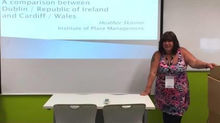All-Inclusive tourism / All-Insidious?
- Jul 23, 2014
- 5 min read
The Growth of All-Inclusive Tourism Packages
As a British tourist, I returned on holiday to Corfu each year for over 10 years, observing changes to the composition of not only the island’s tourists but also its tourism product offering. In particular, I noticed an increasing number of All-Inclusive (AI) resorts being established in Corfu and an apparent decline in the number of tourists out and about in resort bars and tavernas. After my first holiday there, when I booked a self-catering package holiday, on each future visit I booked my flights separately from my accommodation which I booked directly with apartment owners in my chosen resort.

However, many British tourists prefer to book a package direct with a tour operator, as this can often be seen to reduce any perceived risk associated with the DIY approach. Thomson, part of the TUI AG Group, has around 30% of the UK package holiday market share.
With 5.2 million customers, the company is the leading tour operator in the UK and Ireland. TUI Travel PLC’s Fact Sheet (January 2014) reports that the company, ‘one of the world’s leading international leisure travel groups’ overall has 30 million customers from 31 key source markets, and is ‘the number one tour operator in Europe’. Returning to the UK from a holiday in Corfu in August 2011, I read in the Thomson airline’s in-house magazine that its First Choice package holiday brand was going to offer only AI holidays to all foreign destinations from 2012.
All-Inclusive packages are becoming an increasingly attractive option for families on a budget, especially in this time of global economic crisis.All-inclusive holiday packages have provided many benefits to tourism in destinations that may have had difficulty attracting risk-averse tourists due to perceptions of high levels of crime and low levels of tourist security. However, there has been a recent growth in AI holiday packages in Western European destinations, where it appears that cost rather than tourist safety concerns is the primary driver of tourists purchasing AI packages.
Criticisms of All-Inclusive Enclaves
All-Inclusive enclaves in many European destinations that have reached the maturity stage of the Tourism Product Life Cycle have faced much criticism. Many such destinations are now peppered with resorts where a wide range of tourist related businesses have closed down, and where streets that once would have been full of tourists are now empty, or the tourists who do wander around the resort do not feel the need to spend money on local businesses when they have already paid in advance to a tour operator in their home country their holiday budget for food, drink and entertainment.
‘All-inclusives can alienate tourists from the destination they are visiting and the people who live there. This can hamper positive cultural exchange, while allowing resentment to build amongst local people who are blocked from being able to benefit from the tourism economy. This can lead to a vicious circle, in which tourism harassment levels increase (an issue frequently capitalised upon by the hotels themselves), which in turn deters people from leaving the hotels’ (Tourism Concern, 2012).
Tourism Concern also note some of the following negative issues that have been associated with the growth of all-inclusive package holidays in particular countries:
In Majorca, All-Inclusive holidays have been ‘blamed for loss of local business’;
‘only 10% of tourist spend from all-inclusive holidays found its way into local economy’ in certain resorts in Turkey;
All-Inclusive beach holidays ‘contributed least economic benefit’ in Mombasa where 87% of tourists go on all-inclusive holidays and yet over half of local people live on less than $1 a day’;
in Jamaica ‘all-inclusive hotels attracted tourists in the short term but blocked development of other types of tourism, leading to increased tourist harassment’,
All-Inclusive in the Dominican Republic has been blamed for ‘restaurant closures and increased negative attitude towards tourists’,
In Goa, ‘local taxis and guides losing business to all-inclusive resorts’.
In terms of economic impact, a report by the Overseas Development Institute (2011) based on data collected in 2009 by the Travel Foundation, noting ‘although popular with tourists, AI hotels are often criticized for their negative impact on local people and the environment, especially in developing country destinations. The proliferation of AI hotels in destinations such as Turkey is also controversial, due to the perception of reduced benefits to the local economy compared with other types of board basis provided by hotels’, found that
Of the 100% holiday cost spent by an all-inclusive tourist:
Only 55% was directed to the destination country
Only 11% was directed to the destination region
Less than 2% was spent in the local resort
Tourists in search of authenticity
It is interesting to note that the growing preference for tourists to book All-Inclusive holiday packages coincides with an attendant decline in mass tourism in general, as certain market segments of travelers who are increasingly choosing to travel independently, or with smaller tour operators, seek more authenticity in their vacation experiences, and seek to ‘unbundle’ the package holiday.
The increasing quest for authenticity in tourists’ experiences must be seen from both from a supply and demand perspective. Issues of ‘connecting’ people and places therefore become important for place managers and marketers, for a wide range of tourism-related businesses, and also for tourists themselves. Place managers and Destination Marketing Organisations need to explore the ways the tourism product can be created, communicated and delivered in order to increase authenticity through experiential consumption. There is also a need for a better understanding of the way social media can be used by DMOs to engage with and connect with a wide range of stakeholders, and also the way tourists increasingly take control of their connections to places through their own engagement with social media.
Countering the Effects of AI
Many destinations, particularly in Europe, that have relied upon the positive economic effects of mass tourism in the past now face a decline in tourist numbers from former key source markets combined with a decline in tourist spend from mass tourism options; a decreasing tourist season in many resorts; over-reliance on tour operators with low rental fees paid by operators to accommodation providers. This forces place managers to consider the need to refresh and revitalise destination offerings and destination infrastructure, with an attendant need for re-branding & re-positioning to attract higher-spending ‘middle-market’ independent tourists. In this way, these destinations may be able to counter the insidious rise of All-Inclusive enclaves that are forcing such a detrimental effect on local tourism-related businesses. However, this cannot be achieved without attending to improvements in the visual identity and ‘look’ of many resorts that rose in popularity during the 1970s and 1980s, and which can appear outdated to the 21st century traveler; improvements in destination infrastructure; and a consideration of extending the season by targeting niche markets in the shoulder months.
I now live in the beautiful island of Corfu that had been my preferred holiday destination for many years. I believe that Corfu, along with many other European destinations, has reached a ‘tipping point’ where the current decline could become fatal if immediate steps are not taken to halt the decline and turn things around, but that it is not too late to do something positive right now. These destinations must take control of their own tourist fortunes to effect positive change.
With regard to tourists from the UK (although this may be replicated for other source markets), this change should focus on attracting more independent travelers, not package holiday makers (particularly those booking All-Inclusive packages).























Comments